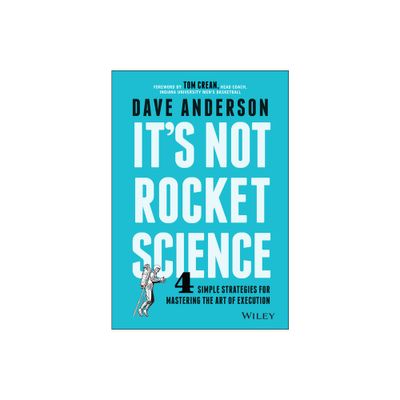Home
Beyond the Saga of Rocket Science: Dawn Space Age
Loading Inventory...
Barnes and Noble
Beyond the Saga of Rocket Science: Dawn Space Age
Current price: $94.99


Barnes and Noble
Beyond the Saga of Rocket Science: Dawn Space Age
Current price: $94.99
Loading Inventory...
Size: Hardcover
*Product Information may vary - to confirm product availability, pricing, and additional information please contact Barnes and Noble
The Dawn of the Space Ag
e takes you on a fascinating journey into our space past. You'll experience what rocket pioneers had to go through to develop today's rockets, missiles, and space vehicles. In bringing to life the drama and complex interplay among scientists, engineers, and politicians that gave birth to the launch vehicles and spacecraft we take for granted today,
The Dawn of the Space Age
harnesses surrounding events as never before: political maneuvering, the drama of spies and counterspies, the feelings that key characters--all of whom are real--experienced, the society and political structure, life-changing crises, and more. You'll be taken behind the scenes and come away with an understanding underlying what happened, what caused it to happen, and what nearly happened.
This highly informative book begins with exciting tales of the earliest developers of rudimentary rockets and the deadly battles they fought in China between 200 and 1600 A.D. A historical fiction approach brings long-ago characters and events to life. The tremendous achievements of the Wright Brothers - Wilbur and Orville - in the early 1900s serve as a useful backdrop for showcasing the difficulties involved in developing completely new technologies for practical use. The ingenious Dr. Robert Goddard, widely acknowledged as the inventor of the modern rocket, developed a sound theory in the 1910s and conducted pioneering flight tests in the 1920s and 1930s, while overcoming many failures. World War II gave the biggest impetus ever to advancing rocket science and related technologies. The book describes how the German V2, Soviet Soyuz, and American Corporal rockets paved the way for the design, fabrication, and operation of more refined, sophisticated second and third-generation missile systems that followed. In the ensuing decades many unsung space heroes on both sides of the Iron Curtain matured the field to where it is today. Led by the indomitable Sergei Korolyov, the Soviet Union captured an early lead over their archrival superpower during the Cold War, and achieved an embarrassing (for the United States) plethora of civilian space firsts. In the U.S., Dr. Wernher von Braun led the American space program during the crucial decades of the 1950s-1960s. He did more than anyone else in America to advance missiles, rockets, spaceflight; and made the manned landings on the moon possible. Von Braun led America's race to the Moon, including the precursor Mercury Program, the Gemini Program, and finally the Apollo Program which landed 12 men on the Moon and returned over 835 pounds (379 kg) of moon rocks to the Earth.
e takes you on a fascinating journey into our space past. You'll experience what rocket pioneers had to go through to develop today's rockets, missiles, and space vehicles. In bringing to life the drama and complex interplay among scientists, engineers, and politicians that gave birth to the launch vehicles and spacecraft we take for granted today,
The Dawn of the Space Age
harnesses surrounding events as never before: political maneuvering, the drama of spies and counterspies, the feelings that key characters--all of whom are real--experienced, the society and political structure, life-changing crises, and more. You'll be taken behind the scenes and come away with an understanding underlying what happened, what caused it to happen, and what nearly happened.
This highly informative book begins with exciting tales of the earliest developers of rudimentary rockets and the deadly battles they fought in China between 200 and 1600 A.D. A historical fiction approach brings long-ago characters and events to life. The tremendous achievements of the Wright Brothers - Wilbur and Orville - in the early 1900s serve as a useful backdrop for showcasing the difficulties involved in developing completely new technologies for practical use. The ingenious Dr. Robert Goddard, widely acknowledged as the inventor of the modern rocket, developed a sound theory in the 1910s and conducted pioneering flight tests in the 1920s and 1930s, while overcoming many failures. World War II gave the biggest impetus ever to advancing rocket science and related technologies. The book describes how the German V2, Soviet Soyuz, and American Corporal rockets paved the way for the design, fabrication, and operation of more refined, sophisticated second and third-generation missile systems that followed. In the ensuing decades many unsung space heroes on both sides of the Iron Curtain matured the field to where it is today. Led by the indomitable Sergei Korolyov, the Soviet Union captured an early lead over their archrival superpower during the Cold War, and achieved an embarrassing (for the United States) plethora of civilian space firsts. In the U.S., Dr. Wernher von Braun led the American space program during the crucial decades of the 1950s-1960s. He did more than anyone else in America to advance missiles, rockets, spaceflight; and made the manned landings on the moon possible. Von Braun led America's race to the Moon, including the precursor Mercury Program, the Gemini Program, and finally the Apollo Program which landed 12 men on the Moon and returned over 835 pounds (379 kg) of moon rocks to the Earth.


















